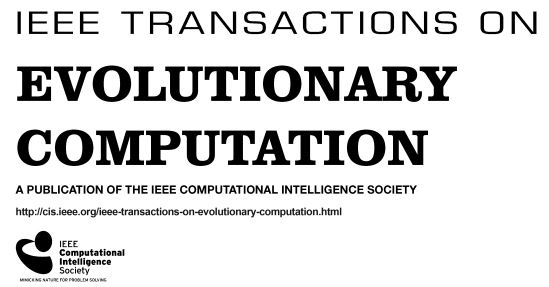A Deep Reinforcement Learning-Assisted Multimodal Multiobjective Bilevel Optimization Method for Multirobot Task Allocation
IF 11.7
1区 计算机科学
Q1 COMPUTER SCIENCE, ARTIFICIAL INTELLIGENCE
引用次数: 0
Abstract
Multirobot task allocation (MRTA) is a challenging bi-level problem in the multirobot cooperative systems (MRCSs) and offers an effective method for addressing complex tasks. However, dynamic /uncertain environments can easily invalidate original schemes in practical MRTA decision-makings. Further, a nested structure in MRTA problems makes computational expensive. Therefore, the two main tasks are 1) finding a sufficient number of equivalent schemes for MRTA problems to adapt to task environments and 2) improving algorithm search efficiency in bi-level optimization problems. In this study, a multimodal multiobjective evolutionary algorithm (MMOEA) based on deep reinforcement learning (DRL) and large neighborhood search (LNS), called MMOEA-DL, is proposed to solve MRTA problems. In the MMOEA-DL, the task allocation problem, which is considered as the upper-level optimization problem, is solved using an improved MMOEA. The traveling salesman problem (TSP) regarded as the lower-level optimization problem is addressed via end-to-end method (i.e., DRL) and LNS. By leveraging the end-to-end method to obtain the results of the lower-level optimization, the bi-level optimization problem is effectively transformed into a single-level optimization problem. To demonstrate the performance of the proposed algorithm, 16 MRTA simulation scenarios and two actual MRTA scenarios with evenly and unevenly distributed task points are introduced in the present study. The simulation results verify that the MMOEA-DL not only provides decision-makers with expanded equivalent optimal schemes to address dynamic environments or unforeseen circumstances, but also offers a novel approach to solve the multimodal multiobjective bi-level optimization problem while saving computational costs.一种深度强化学习辅助的多模态多目标双级优化多机器人任务分配方法
多机器人任务分配(MRTA)是多机器人协作系统中一个具有挑战性的双层次问题,为解决复杂任务提供了一种有效的方法。然而,在实际的MRTA决策中,动态/不确定的环境很容易使原始方案失效。此外,MRTA问题中的嵌套结构使得计算成本很高。因此,两个主要任务是:1)为MRTA问题找到足够数量的等效方案以适应任务环境;2)提高双级优化问题的算法搜索效率。本研究提出了一种基于深度强化学习(DRL)和大邻域搜索(LNS)的多模态多目标进化算法(MMOEA),称为MMOEA- dl,用于解决MRTA问题。在MMOEA- dl中,任务分配问题作为上层优化问题,使用改进的MMOEA来解决。作为低层优化问题的旅行商问题(TSP)通过端到端方法(即DRL)和LNS来解决。利用端到端方法获取下层优化结果,有效地将双层优化问题转化为单层优化问题。为了验证该算法的性能,本研究引入了16个MRTA仿真场景和两个任务点均匀分布和不均匀分布的MRTA实际场景。仿真结果表明,MMOEA-DL不仅为决策者提供了可扩展的等效优化方案以应对动态环境或不可预见情况,而且为解决多模态多目标双级优化问题提供了一种新颖的方法,同时节省了计算成本。
本文章由计算机程序翻译,如有差异,请以英文原文为准。
求助全文
约1分钟内获得全文
求助全文
来源期刊

IEEE Transactions on Evolutionary Computation
工程技术-计算机:理论方法
CiteScore
21.90
自引率
9.80%
发文量
196
审稿时长
3.6 months
期刊介绍:
The IEEE Transactions on Evolutionary Computation is published by the IEEE Computational Intelligence Society on behalf of 13 societies: Circuits and Systems; Computer; Control Systems; Engineering in Medicine and Biology; Industrial Electronics; Industry Applications; Lasers and Electro-Optics; Oceanic Engineering; Power Engineering; Robotics and Automation; Signal Processing; Social Implications of Technology; and Systems, Man, and Cybernetics. The journal publishes original papers in evolutionary computation and related areas such as nature-inspired algorithms, population-based methods, optimization, and hybrid systems. It welcomes both purely theoretical papers and application papers that provide general insights into these areas of computation.
 求助内容:
求助内容: 应助结果提醒方式:
应助结果提醒方式:


